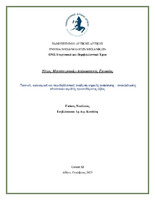| dc.contributor.advisor | Κονδύλη, Αιμιλία | |
| dc.contributor.author | Γκίκας, Νικόλαος | |
| dc.date.accessioned | 2023-11-07T11:45:57Z | |
| dc.date.available | 2023-11-07T11:45:57Z | |
| dc.date.issued | 2023-10 | |
| dc.identifier.uri | https://polynoe.lib.uniwa.gr/xmlui/handle/11400/5606 | |
| dc.identifier.uri | http://dx.doi.org/10.26265/polynoe-5443 | |
| dc.description.abstract | Στην παρούσα εργασία αναπτύχθηκε η αναδυόμενη μέθοδος χημικής ανακύκλωσης των πλαστικών αποβλήτων και παρουσίαζονται στοιχεία που αφορούν την περιβαλλοντική, οικονομική και τεχνολογική απόδοση της. Αρχικά γίνεται αναφορά του προβληματος των πλαστικών παραθέτοντας στοιχέια για τις ποσότητες παραγωγής και διαχείρισης αυτών. Έπειτα αναλύονται οι στόχοι που έχει θέσει η ΕΕ και η Ελλάδα για την πάταξη του προβλήματος των πλαστικών και η πρόοδος αυτών. Τέλος αναφέρεται η τεχνολογική ωριμότητα των τεχνολογιών χημικής ανακύκλωσης καθώς και η περιβαλλοντική και οικονομική τους απόδοση. Από την ανάλυση των παραπάνω τα κύρια συμπεράσματα είναι ότι η παραγωγή των πλαστικών προϊόντων και κατα συνέπεια των αποβλήτων θα συνεχίσει να αυξάνεται παγκοσμίως. Υλικά του τομέα της συσκευασίας όπως PE, PP κ.α. (πολυολεφίνες) είναι τα πιο δημοφιλή και απαρτίζουν το μεγαλύτερο ποσοστό και παραγωγής και αποβλήτων. Οι στόχοι που έχει θέσει η ΕΕ δεν είναι εύκολο να επιτευχθούν απο όλες τις χώρες κράτη μέλη πόσο μάλιστα με την αλλαγή της νομοθεσίας για την μέτρηση του ανακυκλωμένου περιεχομένου. Τεχνολογίες όπως η θερμική πυρόλυση είναι η πιο εμπορική παγκοσμίως παράγοντας ήδη προϊόντα με χημικά ανακυκλωμένο περιέχομενο. Τα περιβαλλοντικά και οικονομικά στοιχεία περί χημικής ανακύκλωσης είναι ενδεικτικά και χρειάζεται περισσότερη έρευνα και διαφάνεια απο τους οργανισμούς και τις εταιρείες. Παρόλα αυτά η χημική ανακύκλωση προβλέπουν οτι θα αποτελέσει πυλώνα στήριξης στο τομέα διαχείρισης των πλαστικών στο μέλλον συμπληρώνοντας την ήδη υπάρχουσα μηχανική. Στην ΕΕ για να συμβεί αυτό πρέπει να θεσμοθετηθούν επιπλέον θέματα και διευκρυνίσεις που αφορούν την χημική ανακύκλωση ώστε να επιταχυνθεί η ένταξη της. Τέλος η σκοπιμότητα κατασκευής μιας μονάδας χημικής ανακύκλωσης στον Ελλαδικό χώρο αμφισβητείται προς το παρόν λόγω έλλειψης σημαντικών στοιχείων που θα δώσουν το πράσινο φώς για την επένδυση. | el |
| dc.format.extent | 92 | el |
| dc.language.iso | el | el |
| dc.publisher | Πανεπιστήμιο Δυτικής Αττικής | el |
| dc.rights | Αναφορά Δημιουργού - Μη Εμπορική Χρήση - Παρόμοια Διανομή 4.0 Διεθνές | * |
| dc.rights.uri | https://creativecommons.org/licenses/by-nc-sa/4.0/deed.el | * |
| dc.subject | Χημική ανακύκλωση | el |
| dc.subject | Κυκλική οικονομία | el |
| dc.subject | Πυρόλυση | el |
| dc.subject | EU recycling targets | el |
| dc.subject | Πλαστικά | el |
| dc.title | Τεχνική, οικονoμική και περιβαλλοντική ανάλυση χημικής ανάκτησης – ανακύκλωσης πλαστικών υψηλής προστιθέμενης αξίας | el |
| dc.title.alternative | Technical, economic and environmental analysis of chemical recovery - recycling of high value-added plastics | el |
| dc.type | Μεταπτυχιακή διπλωματική εργασία | el |
| dc.contributor.committee | Καλδέλλης, Ιωάννης | |
| dc.contributor.committee | Papapostolou, Christiana | |
| dc.contributor.faculty | Σχολή Μηχανικών | el |
| dc.contributor.department | Τμήμα Μηχανολόγων Μηχανικών | el |
| dc.contributor.master | Ενεργειακά και Περιβαλλοντικά Έργα (MSc Energy and Environmental Developments) | el |
| dc.description.abstracttranslated | In this paper, the emerging method of chemical recycling of plastic waste is developed and data concerning its environmental, economic and technological performance are presented. Firstly, the problem of plastics is discussed, providing data on the quantities produced and managed. Then, the objectives set by the EU and Greece to combat the problem of plastics and their progress are analyzed. Finally, the technological maturity of chemical recycling technologies and their environmental and economic performance is mentioned. From the analysis of the above the main conclusions are that the production of plastic products and consequently waste will continue to increase worldwide. Materials in the packaging sector such as PE, PP etc. (polyolefins) are the most popular and make up the largest proportion of both production and waste. The targets set by the EU are not easy to achieve by all Member States, especially with the change in legislation on the measurement of recycled content. Technologies such as thermal cracking are the most commercially viable worldwide, already producing products with chemically recycled content. The environmental and economic data on chemical recycling are indicative and more research and transparency is needed by organizations and companies. However, chemical recycling is predicted to be a pillar of support in the plastics management sector in the future, complementing the existing mechanical recycling. In the EU, for this to happen, additional issues and clarifications concerning chemical recycling need to be established in order to accelerate its integration. Finally, the feasibility of constructing a chemical recycling plant in Greece is currently questioned due to the lack of significant data that would give the green light for the investment. | el |


